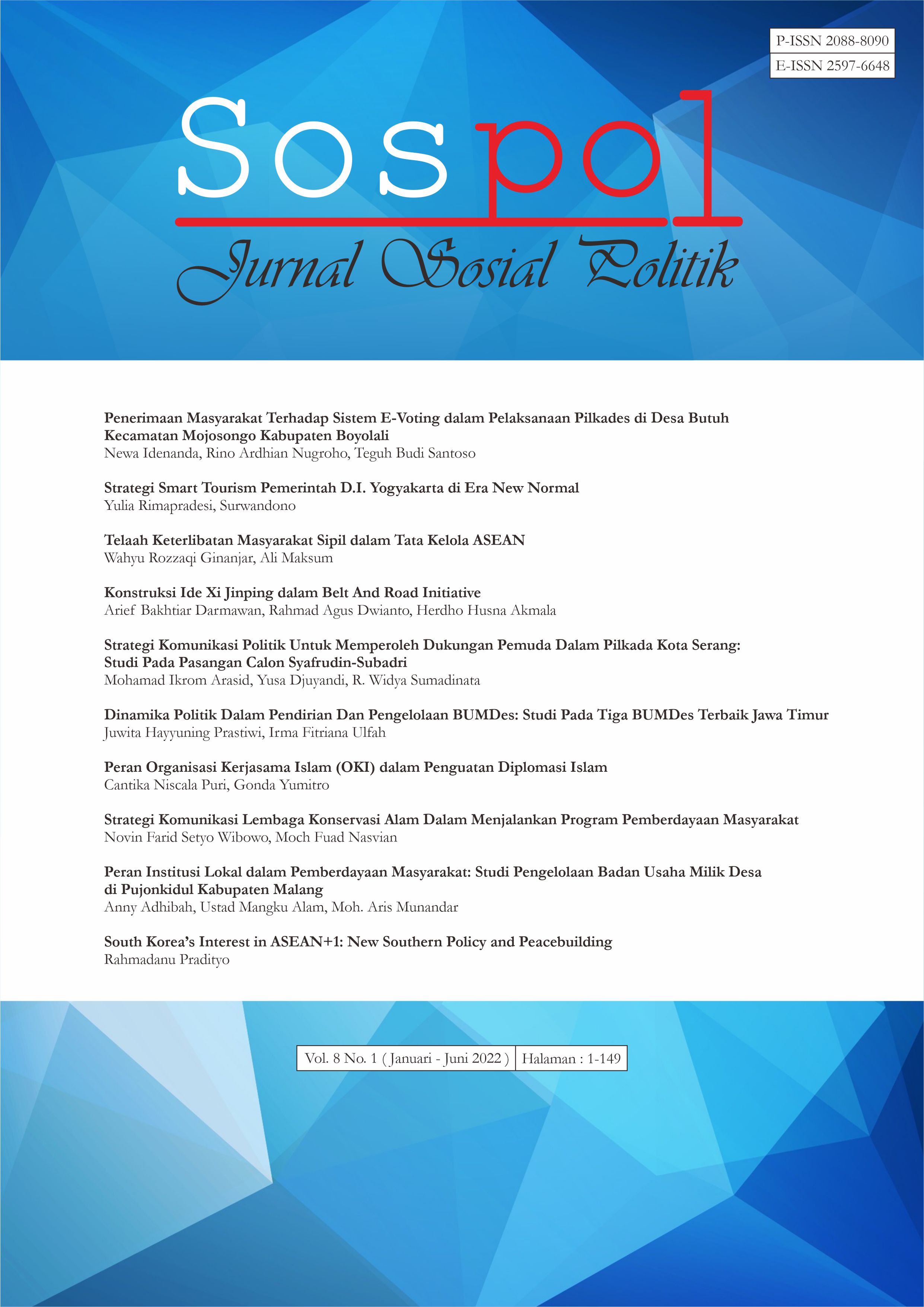South Korea’s Interest in ASEAN+1: New Southern Policy and Peacebuilding
DOI:
https://doi.org/10.22219/jurnalsospol.v8i1.18026Keywords:
ASEAN, South Korea, National Interest, New Southern Policy, PeacebuildingAbstract
ASEAN as a regional organization in Southeast Asia has cooperative relations with state actors and other international organizational actors within the ASEAN+1 framework, one of which is with South Korea. ASEAN relations with South Korea experienced ups and downs due to following the dynamics that occurred on the Korean Peninsula. After the election of Moon Jae In as President of South Korea, the South Korean government emphasized its seriousness to deepen its relations with countries in Southeast Asia and India. This article explains why South Korea has again strengthened its relationship with ASEAN through the New Southern Policy. This study uses the concept of national interest based on English School thinking with a qualitative approach and literature review methods that collect data in the form of books, journals, official government websites, and scientific reports/papers. The results of this study indicate that South Korea has deepened its relationship with ASEAN to realize its national interests in the form of increasing economic cooperation which was affected by the trade war between the United States and China. In addition, South Korea's other national interest is in the form of efforts to achieve peace on the Korean Peninsula through ASEAN member countries that also have bilateral relations with North Korea.
Downloads
References
ASEAN-Korea Centre. (2019a). ASEAN-Korea Chronology. ASEAN-Korea Centre.
https://www.aseankorea.org/eng/ASEAN/ak_chronology.asp
ASEAN-Korea Centre. (2019b). Resources - Statistics. ASEAN-Korea Centre.
https://www.aseankorea.org/eng/Resources/figures.asp
ASEAN. (n.d.). External Relations. ASEAN. Retrieved April 11, 2022, from
https://asean.org/our-communities/asean-political-security-community/outward-
looking-community/external-relations/
ASEAN. (2015). Kuala Lumpur Declaration on a People-Oriented, People-Centered ASEAN. ASEAN.
https://www.google.com/url?sa=t&rct=j&q=&esrc=s&source=web&cd=&cad=rja&
uact=8&ved=2ahUKEwjDkbTFl5j3AhVn63MBHdMZBp0QFnoECCgQAQ&url=htt
ps%3A%2F%2Fasean.org%2Fwp-content%2Fuploads%2F2012%2F05%2F26th-
KUALA-LUMPUR-DECLARATION-ON-A-PEOPLE-ORIENTED-PEOPLE-
CENTRED-ASEAN-Final.pdf&usg=AOvVaw3ZtqNzhcHQEab0j1FFGqRc
Baek, J., & Choi, Y. J. (2020). Do oil price changes really matter to the trade balance? Evidence
from Korea-ASEAN commodity trade data. Australian Economic Papers, 59(3), 250–278.
https://doi.org/10.1111/1467-8454.12180
Barlian, E. (2016). Metodologi Penelitian Kualitatif dan Kuantitatif (Vol. 148).
Bull, H. (2002). The anarchical society: a study of order in world politics. Macmillan international Higher
education.
Burchill, S. (2005). The national interest in international relations theory. In The National Interest in
International Relations Theory. https://doi.org/10.1057/9780230005778
Choe, W. (2021). “New Southern Policy” Korea’s Newfound Ambition in Search of Strategic Autonomy
CHOE Wongi Center for Asian Studies. January.
Choi, I. (2021). ASEAN Outlook on the Indo- Pacific (Aoip) and Korea’s New Southern Policy.
SSRN Electronic Journal. https://doi.org/10.2139/ssrn.3889166
Cronin, P. M., & Lee, S. (2017). Council on Foreign Relations Expanding South Korea’s Security Role in
the Asia-Pacific Region. March.
Darma, S. W., & Hastiadi, F. F. (2017). International Journal of Economics and Financial Issues
Trade Creation and Trade Diversion Effects of the ASEAN-China Free Trade
Agreement, ASEAN-Korea Free Trade Agreement, and ASEAN-India Free Trade
Agreement Implementation on the Export of Indonesia’s. International Journal of
Economics and Financial Issues, 7(6), 51–58. http:www.econjournals.com
Darmalaksana, W. (2020). Metode Penelitian Kualitatif Studi Pustaka dan Studi Lapangan. Pre-
Print Digital Library UIN Sunan Gunung Djati Bandung.
Dermawan, R. (2020). the National Interest Concept in a Globalised International System.
Indonesian Journal of International Relations, 3(2), 30–45.
https://doi.org/10.32787/ijir.v3i2.101
Dunne, T., Kurki, M., & Smith, S. (2013). International Relations Theories Discipline and
Diversity Third Edition. In Oxford University Press (Vol. 3, Issue 1).
Ha, H. T., & Ong, G. (2020). Assessing the ROK’s New Southern Policy towards ASEAN. 7, 1–12.
https://www.iseas.edu.sg/wp-content/uploads/pdfs/ISEAS_Perspective_2020_7.pdf
Hernandez, C. G. (2018). Strengthening Korea-ASEAN Relations through the New Southern Policy.
Howe, B., & Park, M. J. (2019). South Korea’s (incomplete) middle-power diplomacy toward
ASEAN. International Journal of Asia-Pacific Studies, 15(2), 117–142.
https://doi.org/10.21315/ijaps2019.15.2.5
Jackson, R., & Sørensen, G. (2013). Introduction to International Relations Theories and
Approaches. In International Relations: Theories and Approaches.
Kemala, A. (2019). Globalisasi Industri Hiburan Jepang dan Korea: Pengaruh terhadap
Perspektif Publik antar Negara. Global: Jurnal Politik Internasional, 20(2), 201.
https://doi.org/10.7454/global.v20i2.336
Kim, I., Kim, I., & Han, Y. (2014). Deposit Insurance, Banks’ Moral Hazard, and Regulation:
Evidence from the ASEAN Countries and Korea. Emerging Markets Finance and Trade,
(6), 56–71. https://doi.org/10.1080/1540496X.2014.1013875
Kivimäki, T. (2011). East Asian relative peace and the ASEAN Way. International Relations of the
Asia-Pacific, 11(1), 57–85. https://doi.org/10.1093/irap/lcq016
Kwak, S. (2018). Korea’s New Southern Policy: Vision and Challenges. KIEP Opinions, 1–6.
www.kiep.go.kr
Lee, J. (2017). Korea ’ s New Southern Policy towards ASEAN : Context and Direction. 1–13.
Lee, J. (2019). Korea’s New Southern Policy: Motivations of ‘Peace Cooperation’ and
Implications for the Korean Peninsula. The Asan Institute for Policy Studies Issue Brief, 1–19.
https://www.jstor.org/stable/resrep20678
Lee, S. (2020). A South Korean Perspective on ASEAN-ROK Relations: Past, Present and
Future. In C. P. Hoo (Ed.), The New Southern Policy. ISIS Malaysia.
Maksum, A. (2017). Regionalisme dan Kompleksitas Laut China Selatan. Jurnal Sosial Politik, 3(1),
https://doi.org/10.22219/sospol.v3i1.4398
Manan, M. (2017). Foreign Policy and National Interest: Realism and Its Critiques. Jurnal Global
& Strategis, 9(2), 175. https://doi.org/10.20473/jgs.9.2.2015.175-189
Masni, M. (2021). Norm Exemption in States’ NPT Nuclear Disarmament Obligations. Jurnal
Politik Internasional, 23(1), 80–103. https://doi.org/10.7454/global.v23i1.489
Merced, L. D. C. (2017). “Partners” for Change: Understanding the External Relations of ASEAN.
IV(20).
Ministry of Unification South Korea. (2021). Three Goals Moon Jae-In’s Policy on the Korean Peninsula.
Ministry of Unification South Korea.
https://www.unikorea.go.kr/eng_unikorea/policylssues/koreanpeninsula/goals/
Murray, R. W. (2016). An Introduction to the English School of International Relations. https://www.e-
ir.info/2016/01/05/an-introduction-to-the-english-school-of-international-relations/
Neumann, I. B. (2003). The English School on Diplomacy: Scholarly Promise Unfulfilled.
International Relations, 17(3), 341–369. https://doi.org/10.1177/00471178030173006
Nguyen, P. H. N. (2018). Mediation on the Korea Selatann Peninsula: A Chance to Assert
ASEAN Centrality. Young Perspective: The Future of ASEAN-Korea Selatan Partnership, 3.
Nguyen, T. B. N. (2020). The Synergy between ASEAN and the Republic of Korea in Engaging
North Korea: Feasibility and Recommendations. In C. P. Hoo (Ed.), The New Southern
Policy. ISIS Malaysia.
Park, Donghyun; Park, Innwon; Esther B, G. (2008). Is the ASEAN-Korea Free Trade Area
(AKFTA) an Optimal Free Trade Area?
Park, I. (2011). Is AFTA a Desirable Regional Trade Agreement for ASEAN? International Area
Studies Review, 14(4), 49–72. https://doi.org/10.1177/223386591101400404
Perwitasari, A. S. (2021). Badan pengawas nuklir PBB: Korea Utara diduga telah memulai kembali reaktor
nuklir. https://internasional.kontan.co.id/news/badan-pengawas-nuklir-pbb-korea-
utara-diduga-telah-memulai-kembali-reaktor-nuklir
Pramudyani, Y. D. (2019). Menlu Kang: Indonesia berada di pusat “New Southern Policy” Korea -
ANTARA News. https://www.antaranews.com/berita/821806/menlu-kang-indonesia-
berada-di-pusat-new-southern-policy-korea
Presidential Committee on New Southern Policy. (2021). New Southern Policy. Presidential
Committee on New Southern Policy. http://www.nsp.go.kr/eng/main.do
Setnas-Indonesia. (2021a). Sekretariat Nasional ASEAN – Indonesia. http://setnas-asean.id/kerja-
sama-eksternal
Setnas-Indonesia. (2021b). Sekretariat Nasional ASEAN – Indonesia. http://setnas-
asean.id/republik-korea-rok
Siahaan, V. R. (2017). The Victory of Pluralism: The Role of International Law in The South
China Sea Dispute. Jurnal Sosial Politik, 3(1), 162.
https://doi.org/10.22219/sospol.v3i1.4966
Stivachtis, Y. A. (2013). The regional dimension of international society. In Guide to the English
School in International Studies (pp. 109–125). Wiley Online Library.
Stivachtis, Y. A. (2018). Introducing the English School in International Relations Theory. E-International
Relations. https://www.e-ir.info/2018/02/23/introducing-the-english-school-in-
international-relations-theory/
Sulaiman, V. Z. A. (2020). China’s Policy in Refusing North Korea Nuclear Proliferation. Global:
Jurnal Politik Internasional, 22(1), 100. https://doi.org/10.7454/global.v22i1.481
Suwendra, I. W. (2018). Metodologi Penelitian Kualitatif dalam Ilmu Sosial, Pendidikan,
Kebudayaan, dan Keagamaan. In NilaCakra Publishing House, Bandung.
yusuf.staff.ub.ac.id/files/2012/11/Jurnal-Penelitian-Kualitatif.pdf
Tan, E. W., Govindasamy, G., & Park, C. K. (2017). The Potential Role of South-East Asia in
North Korea’s Economic Reforms: The Cases of ASEAN, Vietnam and Singapore.
Journal of Asian and African Studies, 52(2), 172–187.
https://doi.org/10.1177/0021909615570952
Tongzon, J., & Cheong, I. (2016). The ASEAN–Korea Trade In Services (AKTIS) Agreement:
Its Impact on Indonesia and Other ASEAN Countries. Bulletin of Indonesian Economic
Studies, 52(1), 101–117. https://doi.org/10.1080/00074918.2015.1129048
Vo, Q. T. (2018). ASEAN as the Driving Force for a Peaceful Korea. Young Perspective: The Future
of ASEAN-Korea Selatan Partnership, 3.
Yang, B. R., & Mansor, N. (2016). South Korea and Asean: Strategic Partnership for Building an East
Asian Community. 3–21.
Yasinta, V. (2019). 8 Bulan Berlalu, Akhirnya Trump dan Kim Jong Un Kembali Bersua.
https://internasional.kompas.com/read/2019/02/27/19330321/8-bulan-berlalu-
akhirnya-trump-dan-kim-jong-un-kembali-bersua?page=1
Yeo, A. (2020). South Korea’s New Southern Policy and ASEAN-ROK Relations – The Diplomat.
https://thediplomat.com/2020/07/south-koreas-new-southern-policy-and-asean-rok-
relations/
Yoon, A. O. (2020). Korea’s New Southern Policy: Progress, Problems, and Prospects. Asia
Pacific Bulletin, 513.
Yu, T. (2020). Challenges and Prospects for Korea’s New Southern Policy – ASEAN Studies Center
Universitas Gadjah Mada. https://asc.fisipol.ugm.ac.id/2020/08/14/challenges-and-
prospects-for-koreas-new-southern-policy/
Downloads
Published
How to Cite
Issue
Section
License
Copyright (c) 2022 Rahmadanu Pradityo

This work is licensed under a Creative Commons Attribution-ShareAlike 4.0 International License.
Authors who publish with this journal agree to the following terms:
- Authors retain copyright and grant the journal right of first publication with the work simultaneously licensed under a Creative Commons Attribution-ShareAlike 4.0 International License that allows others to share the work with an acknowledgement of the work's authorship and initial publication in this journal.
- Authors are able to enter into separate, additional contractual arrangements for the non-exclusive distribution of the journal's published version of the work (e.g., post it to an institutional repository or publish it in a book), with an acknowledgement of its initial publication in this journal.
- Authors are permitted and encouraged to post their work online (e.g., in institutional repositories or on their website) prior to and during the submission process, as it can lead to productive exchanges, as well as earlier and greater citation of published work (See The Effect of Open Access).

This work is licensed under a Creative Commons Attribution-ShareAlike 4.0 International License.



















